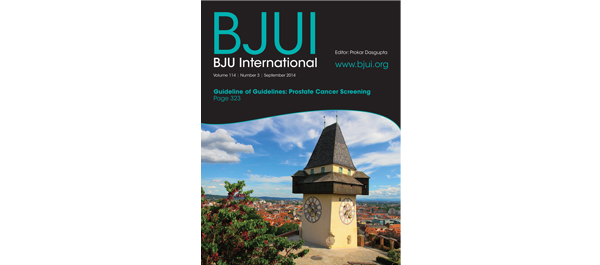Article of the week: RP is safe in patients taking aspirin
Every week the Editor-in-Chief selects the Article of the Week from the current issue of BJUI. The abstract is reproduced below and you can click on the button to read the full article, which is freely available to all readers for at least 30 days from the time of this post.
In addition to the article itself, there is an accompanying editorial written by a prominent member of the urological community. This blog is intended to provoke comment and discussion and we invite you to use the comment tools at the bottom of each post to join the conversation.
Finally, the third post under the Article of the Week heading on the homepage will consist of additional material or media. This week we feature a video from Mr. Sami-Ramzi Leyh-Bannurah discussing his paper.
If you only have time to read one article this week, it should be this one.
Open and robot-assisted radical retropubic prostatectomy in men receiving ongoing low-dose aspirin medication: revisiting an old paradigm?
Sami-Ramzi Leyh-Bannurah, Jens Hansen, Hendrik Isbarn, Thomas Steuber, Pierre Tennstedt, Uwe Michl, Thorsten Schlomm*, Alexander Haese, Hans Heinzer, Hartwig Huland, Markus Graefen and Lars Budäus
Martini Clinic, Prostate Cancer Center at University Hospital Hamburg-Eppendorf, and *Department of Urology, Section for Translational Prostate Cancer Research, University Medical Center Hamburg-Eppendorf, Hamburg, Germany
OBJECTIVE
• To assess blood loss, transfusion rates and 90-day complication rates in patients receiving ongoing 100 mg/day aspirin medication and undergoing open radical prostatectomy (RP) or robot-assisted RP (RARP).
PATIENTS AND METHODS
• Between February 2010 and August 2011, 2061 open RPs and 400 RARPs were performed. All patients received low-molecular-weight heparin for thrombembolism prophylaxis. Aspirin intake during surgery was recorded in 137 patients (5.5%).
• Descriptive statistics and multivariable analyses after propensity-score matching for balancing potential differences in patients with and without aspirin medication were used to assess the risk of blood loss above the median in patients undergoing open RP or RARP.
RESULTS
• The median blood loss in the open RP cohort with and without aspirin medication was 750 and 700 mL, respectively, and in the RARP cohort it was 200 and 150 mL, respectively. Within the same cohorts, transfusions were administered in 21 and 8% and 0 and 1% of patients, respectively.
• The 90-day complication rates in patients with ongoing aspirin medication were 5.8, 4.4, 7.3 and 0% for Clavien grades I, II, III and IV complications, respectively.
• In multivariable analyses and after propensity-score matching, prostate volume (odds ratio 1.03; 95% CI 1.02–1.04; P < 0.01) but not ongoing aspirin medication achieved independent predictor status for the risk of blood loss above the median.
CONCLUSIONS
• Major surgery such as open RP and RARP can be safely performed in patients with ongoing aspirin medication without greater blood loss.
• Higher 90-day complication rates were not detected in such patients.
• Differences in transfusion rates between the groups receiving and not receiving ongoing aspirin medication may be explained by a higher proportion of patients with coronary artery disease in the group receiving ongoing aspirin mediciation. This comorbidity may result in a higher peri-operative threshold for allogenic blood transfusion.



